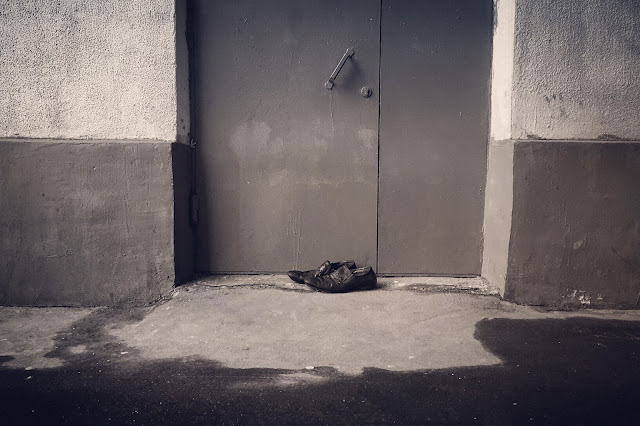I'm not sure who said it, but most artists these days have day jobs. I remember hearing a story about Philip Glass, who lived around the corner from me back on 1st street, and how he was a plumber for quite some time. He was presenting symphonies at night and the next morning, hunched down under someone's kitchen sink grasping for the right wrench. Bukowski and his post office. The list unfolds with sober reminders. No one just sits in a room staring at an empty canvas for days then leaps forward with wet brush in hand, working until the sun comes up. No, we have families and rent to pay. We have dinner to cook, dishes to wash, broken shelves to set right. Laundry, and birthdays.
I find myself in the street with the Leica, as I shuffle around little rivers in the snow to get E from school. I am trying to turn this daily chore into photographs that express the grit of daily life here. I take old trolley buses as part of this journey, and the camera is tucked inside my jacket. There are sometimes faces, tired and quiet staring out the murky windows at the monastery across the river. There are old women with thick rouge making fierce comments to each other. I grab what I can. Sometimes a second bus pulls up next to us and I try to catch the faces behind that glass, the faces staring back at the faces all waiting for the same last stop where feet bring us towards the metro, or a supermarket or a school.
On Saturday afternoon, I am walking fast through the slush on the way to buy bread and eggs. A woman leans from behind a dumpster and I see her picking through the garbage. She is slow, methodical, setting aside anything worth taking. I do not pull the camera from my jacket. She ducks back behind a corrugated aluminum door, into the darkness of the makeshift shed. I see children screaming, a little boy crying. He is throwing a tantrum, laying on the ground flailing his hands around. His mother has harsh words for him, but does not move to pull him up.
Behind a row of parked cars, a pair of dumpsters stand. One of their wheels is broken and they play the part of a perfectly lopsided married couple. I shoot one frame, walking to see if they look good from the opposite side. A man stands in the place they should be, that empty snowless footprint. He is trying on a pair of boots someone threw away. His face jerks up, not expecting to see me. My hand goes up, trying to show him that I am no threat. His face falls, nervous. I walk off, thinking that one frame was all that I needed.
As I turn the corner to pick up E, I see a pair of shoes next to a wall. They stand like some kind of trophy.



Comments